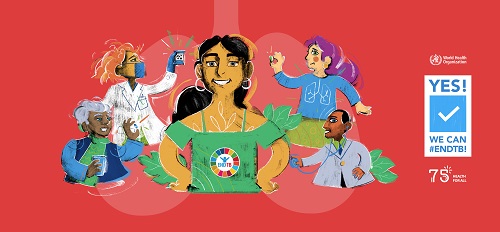
Tuberculosis (TB) remains one of the world’s deadliest infectious killers. Each day, close to 4 400 people lose their lives to TB and close to 30 000 people fall ill with this preventable and curable disease. Global efforts to combat TB have saved an estimated 74 million lives since the year 2000. However, the COVID-19 pandemic, coupled with conflicts across globe and socioeconomic inequities, has reversed years of progress made in the fight to end TB, and placed an even heavier burden on those affected, especially the most vulnerable. In its latest Global Tuberculosis Report, WHO highlighted that the estimated number of deaths from TB increased between 2019 and 2021, reversing years of decline between 2005 and 2019.
World TB Day, falling on March 24 each year, is designed to build public awareness that, tuberculosis today remains an epidemic in much of the world, causing the deaths of nearly one-and-a-half million people each year, mostly in developing countries. The theme of World TB Day 2023 - ‘Yes! We can end TB!’ – conveys a message of hope that getting back-on-track to turn the tide against the TB epidemic is possible through high-level leadership, increased investments, faster uptake of new WHO recommendations and adoption of innovations, accelerated action and multisectoral collaboration.
When considering the national situation, Tuberculosis is the second leading infectious disease in Sri Lanka apart from dengue. The highest number of deaths among infectious diseases is reported for TB patients in Sri Lanka which is around 500 – 600 annually. According to WHO estimates, nearly 14 000 TB patients should be identified annually. However, currently around 7000 – 8000 patients are reported within the country. Therefore, around 4000-5000 patients are undiagnosed or underreported and missed each year. In 2022, 8342 TB patients were reported to the National Tuberculosis Programme with around 58% case notification rate compared to WHO estimates. The presence of undetected TB patients in the community leads to spread of the infection as around 10-15 individuals per year are infected by an untreated TB patient.
In Sri Lanka, several key factors attributed to lower case notification for TB cases :(1) COVID-19 pandemic related movement and travel restrictions; (2) overburdened health system as many staff were involved in COVID-19 related surveillance, contact tracing and case management activities; and (3) changed health-seeking behavior among patients. As such, it is evident that the pandemic has heaped more challenges to already existing difficulties with regards to TB care and prevention. The existing challenges Sri Lanka has been attempting to tackle over the years are low rates of child case detection, higher death rate, poor outpatient referral mechanisms for presumptive TB patients, inadequate contact screening activities and weak public-private partnership.
However, Sri Lanka with its well-established health system has committed itself to achieving the ambitious target of bringing down TB incidence to 13 per 100 000 from 65 per 100 000 (the baseline in 2015) by 2035 as per the Sustainable Development Goals (SGDs) of the United Nations.
WHO Sri Lanka continues to support the National Tuberculosis Programme to improve TB care and prevention in Sri Lanka. WHO has supported the country to roll out the latent TB screening and management programmes. WHO support has manifested itself through the development of a ‘Latent TB electronic patient information system’ as an additional module to the existing electronic patient information system. In addition, laboratory diagnosis of TB infection among high-risk groups were strengthened by procuring the Interferon-Gamma Release Assays (whole-blood tests) to diagnose TB infection.
WHO Sri Lanka has also supported the study to identify the prevalence of latent TB among healthcare workers in the curative sector in the Colombo district.
It is also vital for Sri Lanka to find the ‘missing’ (underreported and/or under-diagnosed) 4 000 cases and break the cycle of transmission. WHO is currently supporting the Ministry of Health to conduct an inventory study to quantify the level of under-reporting and estimate TB incidence using capture–recapture method.
WHO will continue supporting Sri Lanka to achieve ‘end TB targets’. The support will mainly focus on reviewing the National TB programme, updating the strategies, ensuring the uninterrupted supply of quality- assured drugs by procuring 1st line anti-TB medicines, providing technical assistance and strategic advice on updating national guidelines among others.
